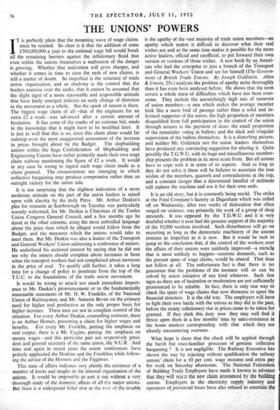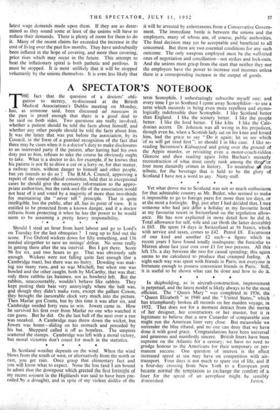THE UNIONS' POWERS
/T is perfectly plain that the mounting wave of wage claims must be resisted. So clear is it that the addition of some £500,000,000 a year to the national wage bill would break all the remaining bathers against the inflationary flood that even within the unions themselves a realisation of the danger is growing. Whether that realisation will grow sharper, and whether it comes in time to stem the rush of new claims, is still a matter of doubt. So imperfect is the structure of trade union organisation, and so shadowy is the control that the leaders exercise over the ranks, that it cannot be assumed that the slight signs"- of a more reasonable and responsible attitude that have lately emerged indicate an early change of direction in the movement as a whole. But the spark of reason is there. The biggest wage claim of all—that of the engineers for an extra £2 a week—was advanced after a certain amount of hesitation. It has some of the marks of an extreme bid, made in the knowledge that it might have to be modified later. It is just as well that this is so, since this claim alone would far outstrip even the most exaggerated assessment of the increase in prices brought abOut by the Budget. The shipbuilding unions within the huge Confederation of Shipbuilding and Engineering Unions have rather pointedly made their own wage claim without mentioning the figure of £2 a week. It would in any case be wrong to regard each wagee-claim made as a - claim granted. The circumstances are emerging in which collective bargaining may produce compromise rather than an outright victory for the union side.
It is not surprising that the slightest indication of a more moderate attitude on the part of the union leaders is seized upon with alacrity by the daily Press. Mr. Arthur Deakin's plea for restraint at Scarborough on Tuesday was particularly warmly welcomed, for Mr. Deakin is Chairman of the Trades Union Congress General Council, and a few months ago he stood at the other extreme, using the most unbridled language about the price rises which he alleged would follow from the Budget, and the measures which the unions would take to meet them. But Mr. Deakin was also a leader of the Transport and General Workers' Union addressing a conference of miners. He underlined his sectional interest by saying that he did not see why the miners should complain about increases in fares when the transport workers had not complained about increases in the price of coal. To qualify still further, it takes a long time for a change of policy to penetrate from the top of the T.U.C. to the foundations of the trade union movement.
It would be wrong to attach too much immediate import- ance to Mr. Deakin's pronouncement or to the fundamentally reasonable statements of Mr. H. W. Franklin, of the National Union of Railwaymen, and Mr. Aneurin Bevan on the primary need for higher real production as the only proper basis for higher incomes. These men are not in complete control of the situation. For every Arthur Deakin, counselling restraint, there is an Arthur Homer, presenting a claim for higher wages and benefits. 'For every Mr. Franklin, putting the emphasis on real output, there is a Mr. Figgins, putting the emphasis on money wages—and this particular pair are respectively presi- dent and general secretary of the same union, the N.U.R. And time and again in recent years the union conferences have politely applauded the Deakins and the Franklins while follow-. ing the advice of the Homers and the Figginses. I This state of affairs indicates very plainly the existence of a number of knots and tangles in the internal organisation of the unions. It would be impossible to sort it out without a very -thorough study of the domestic affairs of all -de major unions. But there is a widespread belief that at the root of the trouble is the apathy of the vast majority of trade union members—an apathy which makes it difficult to discover what their real wishes are and at the same time -makes it possible for the more active leaders, official and unofficial, to put forward their own version or versions of those wishes. A new book-by an Ameri- can who had the enterprise to join a branch of the transport and General Workers' Union and see for himself (The Govern- ment of British Trade Unions. By Joseph Goldstein. Allen & Unwin, 25s.) analyses the problem of apathy more thoroughly than it has even been analysed before. He shows that the term covers a whole mass- of difficulties which have not been over- come. They include the astonishingly high rate of turnover of union members—a rate which makes the average member look like a mere bird of passage rather than a solid and in- formed supporter of the union; the high proportion of members disqualified from full participation in the control of the union through arrears in the payment of dues; the small proportion of the remainder voting in ballots; and the slack and irregular supervision of the ballots themselves. It is a disturbing picture, and neither Mr., Goldstein nor the union leaders themselves have produced any convincing suggestion for altering it. Quite possibly the T.G.W.U. with its huge and miscellaneous member- ship presents the problem in its most acute form. But all unions have to cope with it in some of its aspects. And so long as they do not solve it there will be failures to ascertain the true wishes of the members, quarrels and contradictions at-the top, and a constant danger that a determined handful of militants will capture the machine and use it for their own ends.
It is an old story, but it is constantly being retold. The strike at the Ford Company's factory at Dagenham which was called off on Wednesday, after two weeks of dislocation that often verged on violence, was primarily the work of a group of shop stewards. It was opposed by the T.G.W.U. and it is very doubtful whether it ever had the genuine support of the majority of the 10,000 workers involved. Such disturbances will go on occurring as long as the democratic machinery of the unions remains as imperfect as it is now. But it would be rash to jump to the conclusion that, if the control of the workers over the affairs of their unions were suddenly improved—a miraclp that is most unlikely to happen—extreme demands; such as the present spate of wage claims, would be abated. That does not follow at all. The unfortunate fact is that there is no guarantee that the problems of the moment will or can be solved by union initiative of any kind whatever. Such few signs as there are of hesitation or moderation are not sufficiently pronounced to be reliable. In fact, there is only one way to check the spate of wage claims that now threatens to upset the financial structure. It is the old way. The employers will have to fight their own battle with the unions as they did in the past, before the steady inflationary rise in prices came to be taken for granted. If they shirk this duty now they may well find it thrust upon them in a few months' time by sales-resistance in the home markets corresponding with that which they are already encountering overseas.- What hope is there that the check will be applied through the harsh but once-familiar processes of genuine collective bargaining ? It is not negligible. The Railway Executive has shown the way by rejecting without qualification the railway unions' claim for a 10 per cent. wage increase and extra pay for work on Saturday afternoons. The National Federation of Building Trade Employers have made it known in advance that they, will reje:t the new claim announced by the building unions. 'Employers in the electricity supply industry and operators of provincial buses have also refused to entertain the latest wage demands made upon them. If they are as deter- mined as they sound some at least of the unions will have to reduce their demands. There is plenty of room for them to do it. Many of the recent claims far exceeded the increase in the cost of living over the past few months. They have undoubtedly been inflated in the hope of covering, and' more than covering, price rises which may occur in the future. This attempt to beat the inflationary spiral is both pathetic and perilous. It must be stopped. It is most unlikely that it will be stopped voluntarily by the unions themselves. It is even less likely that it will be arrested by exhortations from a Conservative Govern- ment. The immediate battle is between the unions and the employers, many of whom are, of course, public authorities. The final decision may yet be acceptable and beneficial to all concerned. But there are two essential conditions for any such outcome. The only weapons employed must be the well-tried ones of negotiation and conciliation—not strikes and lock-outs. And the unions must grasp from the start that neither they nor the employers have the power to increase real incomes unless there is a 'corresponding increase in the output of goods.








































 Previous page
Previous page